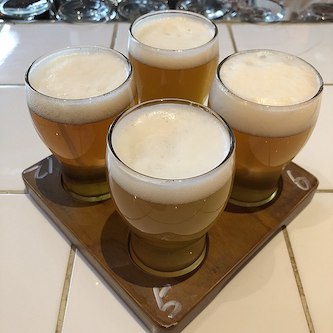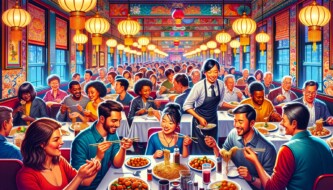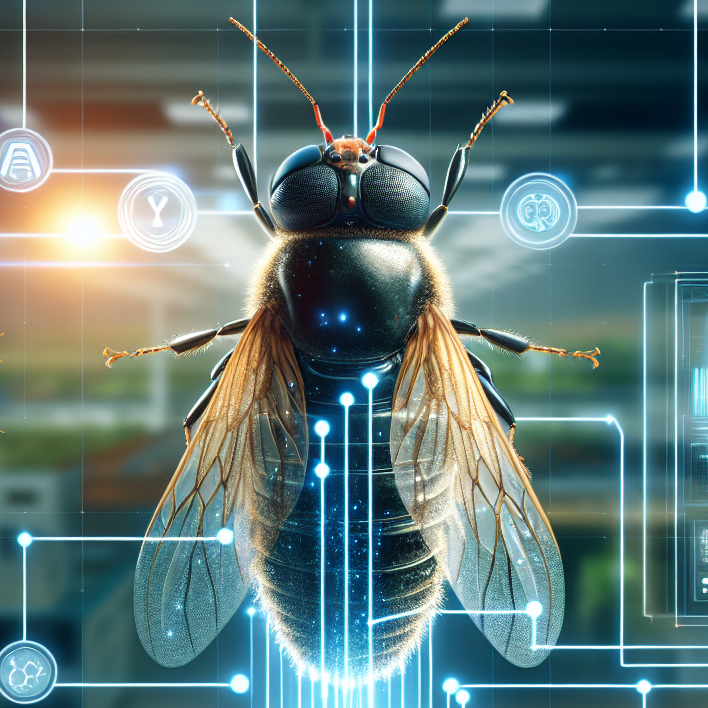Charles Denby, the co-founder and CEO of Berkeley Yeast, is passionate about making beer taste better by changing the genetic makeup of yeast. His company focuses on altering yeast strains to add new flavors and get rid of ones that aren’t so great. For example, their Tropics yeast is designed to give beer the flavors of passion fruit and guava, so brewers don’t have to add extra ingredients for that taste. Even though these genetically modified (GM) yeasts are popular in the US, they have rules against them in many countries, like the UK.
Berkeley Yeast’s GM yeasts have uses beyond just making beer taste better. They’ve made strains that can get rid of bad flavors and speed up making certain types of beer. But using GM technology in brewing is still a big debate, with worries about what people will think and if it’ll be allowed by the rules. Some brewers, like Lagunitas Brewing, are careful about using GM yeasts because they’re worried about what customers will think and because of the connection between GM foods and certain companies.
On the other hand, Carlsberg, a big beer maker, has a policy against using GM stuff. They focus on natural ways to breed barley and hops that can handle tough conditions. This lines up with the company’s commitment to traditional methods and what customers like. The argument about GM beers shows how different brewers have different ways of doing things, with some liking genetic engineering and others putting natural breeding methods first.
In the future, people who support GM beers hope to make brews that stay fresh for longer and always taste the same. Even though there’s still a big argument and rules against it, the idea of GM technology changing how beer is made is something that people are really interested in. As the industry keeps changing, having both GM and non-GM ways of making beer shows how complicated things are in the future of beer.
Original news source: Would you drink genetically modified beer? (BBC)
Listen
Slow
Normal
Fast
Group or Classroom Activities
Warm-up Activities:
– News Summary
Instructions: Students will work in pairs to summarize the article in their own words, focusing on the main points. They should aim to create a summary in under 100 words. Afterward, they can share their summaries with the class and discuss any differences in what they considered important information.
– Opinion Poll
Instructions: Conduct a class opinion poll on the use of genetically modified yeast in brewing beer. Create a scale from ‘strongly agree’ to ‘strongly disagree’ and have students stand at the point that represents their opinion. Then, ask volunteers to explain their stance and encourage a respectful class discussion on the topic.
– Vocabulary Pictionary
Instructions: Write down key vocabulary from the article on slips of paper (e.g., genetically modified, strains, brewing, natural breeding, etc.). Divide the class into two teams. Members of each team take turns drawing the words for their teammates to guess within a given time limit. The team with the most correct guesses wins.
– Synonym Challenge
Instructions: List several keywords from the article (e.g., alter, debate, commitment, policy, etc.). In groups, students must come up with as many synonyms as they can for each word. This can be done as a competition to see which group can come up with the most synonyms.
– Future Predictions
Instructions: Individually or in small groups, students will write down their predictions about the future of beer production based on the article. They should consider the role of GM technology and natural methods. Afterward, ask them to share their predictions with the class and discuss which seem most likely and why.
Comprehension Questions:
1. What is Charles Denby’s role at Berkeley Yeast and what is his main goal for beer?
2. How does the Tropics yeast change the flavor of beer?
3. Why are genetically modified yeasts not allowed in some countries, such as the UK?
4. Besides improving taste, what other benefits do Berkeley Yeast’s GM strains offer for brewing beer?
5. Why are some breweries like Lagunitas Brewing cautious about using GM yeasts?
6. What is Carlsberg’s stance on using genetically modified ingredients in their beer production?
7. What are some of the benefits people hope to achieve with GM beers in the future?
8. How does the current debate on GM beers reflect the different approaches brewers have towards beer production?
Go to answers ⇩
Listen and Fill in the Gaps:
Charles Denby, the co-founder and CEO of Berkeley Yeast, is passionate about making beer taste better by changing the genetic (1)______ of yeast. His company focuses on altering yeast (2)______ to add new flavors and get rid of ones that aren’t so (3)______. For example, their Tropics yeast is designed to give beer the flavors of passion fruit and guava, so brewers don’t have to add extra ingredients for that taste. Even though these genetically (4)______ (GM) yeasts are popular in the US, they have rules against them in many countries, like the UK.
Berkeley Yeast’s GM yeasts have uses beyond just making beer (5)______ better. They’ve made strains that can get rid of bad flavors and speed up making certain types of beer. But (6)______ GM technology in (7)______ is still a big debate, with worries about what people will think and if it’ll be allowed by the rules. Some brewers, like Lagunitas Brewing, are careful about using GM yeasts because they’re (8)______ about what customers will (9)______ and because of the connection between GM foods and certain companies.
On the other hand, Carlsberg, a big beer maker, has a policy against using GM stuff. They focus on natural ways to breed barley and hops that can handle tough conditions. This lines up with the company’s commitment to traditional (10)______ and what customers like. The argument about GM beers shows how different brewers have different ways of doing (11)______, with some (12)______ genetic engineering and others (13)______ natural breeding methods first.
In the future, people who support GM beers hope to make brews that stay fresh for longer and always taste the same. Even though there’s still a big argument and rules against it, the idea of GM technology changing how beer is made is something that people are really (14)______ in. As the industry keeps changing, having both GM and non-GM ways of (15)______ beer (16)______ how complicated things are in the future of beer.
Go to answers ⇩
Discussion Questions:
Students can ask a partner these questions, or discuss them as a group.
1. What is your favorite flavor to taste in a drink, and why?
2. How would you feel if you found out your favorite beer was made with genetically modified yeast?
3. Do you think changing the genetic makeup of food or drinks is a good idea? Why or why not?
4. Have you ever tried a beer or drink with unusual flavors like passion fruit or guava? Did you like it?
5. What is something you eat or drink that you wish could have a better taste?
6. Do you prefer natural ingredients in your food and drinks, or are you open to artificial flavors?
7. How do you think a company should balance tradition and innovation when making their products?
8. What are some of the benefits and drawbacks of using genetically modified organisms in food production?
9. Would you buy a beer that promises to stay fresh longer, even if it uses GM technology? Why or why not?
10. Do you think it’s important for companies to listen to their customers’ concerns about GM foods?
11. Can you think of any other industries where using genetic modification might be beneficial or controversial?
12. How do you think laws and regulations should handle genetically modified products?
13. What is more important to you when choosing a drink: the flavor or how it’s made?
14. Do you think genetically modifying yeast could have any unexpected effects on the environment or health?
15. Would you be willing to try a beer made with genetically modified yeast if it was proven to be safe? Why or why not?
Individual Activities
Vocabulary Meanings:
Match each word to its meaning.
Words:
1. yeast
2. genetic
3. flavors
4. GM
5. brewers
6. Carlsberg
7. natural
8. industry
Meanings:
(a) People who make beer
(b) A big beer maker
(c) Tiny organism used in making beer
(d) Relating to the genes and DNA
(e) Not made with genetic modification
(f) The business of making and selling beer
(g) Genetically modified
(h) Different types of tastes
Go to answers ⇩
Multiple Choice Questions:
1. What is the focus of Berkeley Yeast?
(a) Making wine taste better
(b) Altering yeast strains to change beer flavors
(c) Creating new types of bread
(d) Developing genetically modified fruits
2. Why is the Tropics yeast designed?
(a) To give beer the flavors of passion fruit and guava
(b) To make beer taste like chocolate
(c) To speed up the fermentation process
(d) To remove all flavors from the beer
3. In which country are there rules against using GM yeasts in beer?
(a) US
(b) Germany
(c) UK
(d) France
4. Why are some brewers hesitant about using GM yeasts?
(a) They are concerned about the taste of the beer
(b) They are against genetic engineering
(c) They are not interested in improving beer flavors
(d) They are worried about what customers will think
5. What is Carlsberg’s policy regarding GM stuff?
(a) They are the biggest supporters of GM technology
(b) They are neutral about GM technology
(c) They are still deciding on their policy
(d) They have a policy against using GM stuff
6. What does Carlsberg focus on in their brewing methods?
(a) Natural ways to breed barley and hops
(b) Using GM yeasts to improve flavors
(c) Creating new types of beer
(d) Speeding up the brewing process
7. What are people who support GM beers hoping to achieve in the future?
(a) Brews that have a shorter shelf life
(b) Brews that stay fresh for longer and always taste the same
(c) Brews with constantly changing flavors
(d) Brews that are more expensive
8. What does the article suggest about the future of beer making?
(a) It will only involve GM methods
(b) It will only involve non-GM methods
(c) It will involve both GM and non-GM methods
(d) It will not change at all
Go to answers ⇩
True or False Questions:
1. Charles Denby is the co-founder and CEO of Berkeley Yeast, a company that focuses on maintaining the genetic makeup of yeast to make beer taste better.
2. The debate about GM beers shows how similar brewers have similar approaches, with all supporting genetic engineering and prioritizing natural breeding methods.
3. Supporters of GM beers hope to create brews that stay fresh for longer and always taste the same, despite the ongoing argument and rules against GM technology in brewing.
4. Berkeley Yeast’s GM yeasts can also get rid of bad flavors and speed up making certain types of beer.
5. Genetically modified (GM) yeasts are popular in the US and are also allowed in countries like the UK.
6. Lagunitas Brewing is enthusiastic about using GM yeasts due to positive customer opinions and the connection between GM foods and certain companies.
7. Berkeley Yeast’s Tropics yeast is designed to give beer the flavors of passion fruit and guava without needing extra ingredients.
8. Carlsberg, a big beer maker, has a policy against using GM stuff and focuses on natural breeding methods for barley and hops.
Go to answers ⇩
Write a Summary:
Write a summary of this news article in two sentences.
Check your writing now with the best free AI for English writing!
Writing Questions:
Answer the following questions. Write as much as you can for each answer.
Check your answers with our free English writing assistant!
1. What is Charles Denby’s goal for beer with his company, Berkeley Yeast?
2. Why might some breweries be hesitant to use GM yeasts in their beer production?
3. What is Carlsberg’s stance on using genetically modified ingredients in their beer-making process?
4. How do supporters of GM beers envision the future of beer?
5. What are the potential benefits and challenges of using GM technology in brewing, according to the article?
Answers
Comprehension Question Answers:
1. What is Charles Denby’s role at Berkeley Yeast and what is his main goal for beer?
Charles Denby is the co-founder and CEO of Berkeley Yeast, and his main goal is to improve the taste of beer by changing the genetic makeup of yeast.
2. How does the Tropics yeast change the flavor of beer?
The Tropics yeast is engineered to give beer the flavors of passion fruit and guava without the need for adding extra ingredients to achieve that taste.
3. Why are genetically modified yeasts not allowed in some countries, such as the UK?
Genetically modified yeasts are banned in some countries because of strict regulations against genetically modified organisms (GMOs).
4. Besides improving taste, what other benefits do Berkeley Yeast’s GM strains offer for brewing beer?
Berkeley Yeast’s GM strains can also eliminate off-flavors and speed up the brewing process for certain types of beer.
5. Why are some breweries like Lagunitas Brewing cautious about using GM yeasts?
Lagunitas Brewing is cautious about using GM yeasts because of concerns about customer perception and the negative reputation of GM foods associated with certain companies.
6. What is Carlsberg’s stance on using genetically modified ingredients in their beer production?
Carlsberg has a policy against using genetically modified ingredients and instead focuses on natural breeding techniques for barley and hops that can withstand harsh conditions, aligning with their commitment to traditional methods and customer preferences.
7. What are some of the benefits people hope to achieve with GM beers in the future?
Supporters of GM beers hope to create brews that have a longer shelf life and consistent taste.
8. How does the current debate on GM beers reflect the different approaches brewers have towards beer production?
The debate on GM beers highlights the varying philosophies of brewers, with some embracing genetic engineering to improve beer and others prioritizing natural breeding methods.
Go back to questions ⇧
Listen and Fill in the Gaps Answers:
(1) makeup
(2) strains
(3) great
(4) modified
(5) taste
(6) using
(7) brewing
(8) worried
(9) think
(10) methods
(11) things
(12) liking
(13) putting
(14) interested
(15) making
(16) shows
Go back to questions ⇧
Vocabulary Meanings Answers:
1. yeast
Answer: (c) Tiny organism used in making beer
2. genetic
Answer: (d) Relating to the genes and DNA
3. flavors
Answer: (h) Different types of tastes
4. GM
Answer: (g) Genetically modified
5. brewers
Answer: (a) People who make beer
6. Carlsberg
Answer: (b) A big beer maker
7. natural
Answer: (e) Not made with genetic modification
8. industry
Answer: (f) The business of making and selling beer
Go back to questions ⇧
Multiple Choice Answers:
1. What is the focus of Berkeley Yeast?
Answer: (b) Altering yeast strains to change beer flavors
2. Why is the Tropics yeast designed?
Answer: (a) To give beer the flavors of passion fruit and guava
3. In which country are there rules against using GM yeasts in beer?
Answer: (c) UK
4. Why are some brewers hesitant about using GM yeasts?
Answer: (d) They are worried about what customers will think
5. What is Carlsberg’s policy regarding GM stuff?
Answer: (d) They have a policy against using GM stuff
6. What does Carlsberg focus on in their brewing methods?
Answer: (a) Natural ways to breed barley and hops
7. What are people who support GM beers hoping to achieve in the future?
Answer: (b) Brews that stay fresh for longer and always taste the same
8. What does the article suggest about the future of beer making?
Answer: (c) It will involve both GM and non-GM methods
Go back to questions ⇧
True or False Answers:
1. Charles Denby is the co-founder and CEO of Berkeley Yeast, a company that focuses on maintaining the genetic makeup of yeast to make beer taste better. (Answer: False)
2. The debate about GM beers shows how similar brewers have similar approaches, with all supporting genetic engineering and prioritizing natural breeding methods. (Answer: False)
3. Supporters of GM beers hope to create brews that stay fresh for longer and always taste the same, despite the ongoing argument and rules against GM technology in brewing. (Answer: True)
4. Berkeley Yeast’s GM yeasts can also get rid of bad flavors and speed up making certain types of beer. (Answer: True)
5. Genetically modified (GM) yeasts are popular in the US and are also allowed in countries like the UK. (Answer: False)
6. Lagunitas Brewing is enthusiastic about using GM yeasts due to positive customer opinions and the connection between GM foods and certain companies. (Answer: False)
7. Berkeley Yeast’s Tropics yeast is designed to give beer the flavors of passion fruit and guava without needing extra ingredients. (Answer: True)
8. Carlsberg, a big beer maker, has a policy against using GM stuff and focuses on natural breeding methods for barley and hops. (Answer: True)
Go back to questions ⇧















